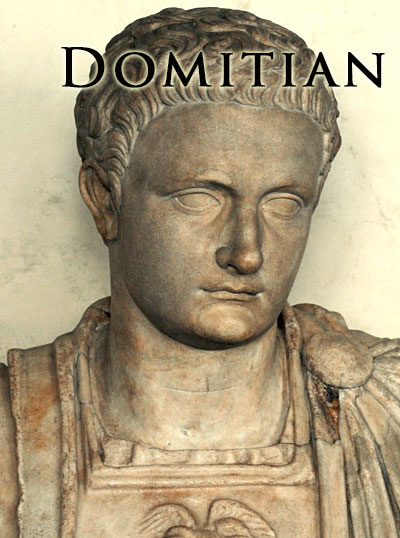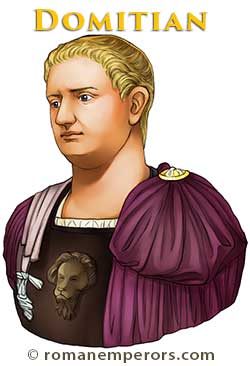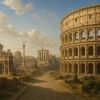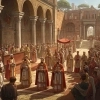Roman Emperor Domitian
81 - 96 A.D.
Titus Flavius Caesar Domitianus Augustus
Busts, Statues, Coins, Information, Maps, Images, and More

Domitian: A Reign of Tyranny or Misunderstood Ruler?
Domitian, Roman emperor from 81 to 96 AD, remains a controversial figure. Painted as a tyrannical madman by some historians, recent scholarship offers a more nuanced view. Separating fact from fiction is crucial to understanding this complex emperor who ruled during a pivotal time in Roman history.
A Privileged Upbringing Overshadowed by Tragedy
Born Titus Flavius Domitianus in 51 AD, Domitian was the younger son of Vespasian, who founded the Flavian dynasty. His childhood was marked by the turmoil of his father's rise to power during the Year of the Four Emperors (69 AD). He witnessed the violent deaths of his older brother Titus and his uncle, underscoring the fragility of life and the brutality of Roman politics.
A Hesitant Start and Growing Paranoia
Domitian initially played a supporting role in his father's and brother's reigns. He held prestigious titles but lacked real power. Upon Titus' death in 81 AD, Domitian became emperor, facing skepticism from the Senate and accusations of manipulating the succession. This early mistrust may have contributed to his growing paranoia.
Consolidating Power and a Focus on Military Strength
Domitian focused on strengthening his position. He increased the size of the Praetorian Guard, the elite unit stationed in Rome, ensuring their loyalty. He also secured the frontiers through successful military campaigns in Germania and Britain. These victories bolstered his image and brought much-needed stability to the empire.
The Tyrannical Image: Fact or Fabrication?
Many historical accounts portray Domitian as a ruthless tyrant. He purged his rivals, executed senators, and engaged in lavish self-promotion. However, some argue these portrayals were fueled by disgruntled senators who resented his centralization of power.
Was Domitian a Patron of the Arts?
Domitian's legacy extends beyond accusations of tyranny. He was a patron of the arts, overseeing the restoration of public buildings destroyed in a fire and supporting literary figures. He also instituted public games and festivals, entertaining the populace.
The Persecution of Christians and the Question of Religious Tolerance
Domitian's reign saw a rise in the persecution of Christians, who were accused of atheism and disloyalty. The motives behind this persecution remain unclear. It could have been fueled by a genuine desire to uphold traditional Roman religion or a political ploy to eliminate potential threats.
A Violent End and a Legacy Revisited
In 96 AD, Domitian was assassinated by members of the court in a palace conspiracy. His reign, though tumultuous, ushered in a period of relative stability within the Flavian Dynasty.
Beyond the Sensational Narrative: Reassessing Domitian's Rule
Modern historians are reevaluating Domitian's legacy. While his paranoia and power struggles are undeniable, his achievements in strengthening the military, promoting public works projects, and patronizing the arts cannot be ignored. He may have been a difficult ruler, but perhaps not the bloodthirsty tyrant portrayed in earlier accounts.
The Importance of Historical Context
Understanding Domitian's reign requires contextualizing it within the turbulent times following the civil war and the consolidation of power by the Flavian Dynasty. The need to maintain control and quell potential threats likely influenced his actions.
Domitian: A Complex Figure in a Time of Transition
Domitian remains a complex and fascinating figure. His legacy is a reminder of the dangers of unchecked power, the difficulty of navigating a tumultuous political landscape, and the importance of considering different historical perspectives. While his reign may not have been marked by grand conquests, it played a crucial role in laying the groundwork for the stability and prosperity that would follow.

More to Come

"lord and god"
Domitian was the brother of Titus and the youngest son of Vespasian, he was the third of the Flavian line of emperors. He resented his father's favoritism toward his brother Titus, who was 12 years older than he. Even though he had much less training by his father, the first few years he managed public affairs and maintain popularity. He was an active builder, maintained strict order, and was determined to follow in the footsteps of Augustus. Yet the historian Suetonius noted that there was a lack of money, and this made him greedy and cruel. He demanded absolute authority, and considered himself divine, he was to be addressed as dominus et deus "lord and god." The Senate opposed him and in 88 A.D. the commanders of four legions in Germany revolted against him, yet when Domitian learned of this he had them executed or exiled. Several years later he severely persecuted the sect of the "Christians" and had the apostle John banished to the Island of Patmos. In 92 A.D. two of Domitian's legions were crushed by the Dacians (near modern Romania) and this led to many plots again Domitian's life. He was finally murdered in 96 A.D. and it is recorded that the assassins were his wife, his attendant, and the commanders of the Praetorian Guard who stabbed him to death in his bed-chamber. Domitian was the last of the twelve Caesars.

















Latest




Popular




Useful




